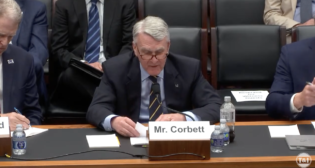
NYMTA Adopts 2021 Budget— Assuming Federal Relief
Written by Marybeth Luczak, Executive EditorThe New York Metropolitan Transportation Authority (MTA) Board on Dec. 16 agreed on a 2021 budget and 2021-24 financial plan that assumes federal relief will arrive—despite Congress’ continuing debate on the next COVID-19 relief package. Officials said the budget assumes MTA will receive $4.5 billion as part of that package.
For 2020 and 2021, MTA reported it has closed budget deficits exceeding a combined $8 billion. But it would still face nearly $8 billion in deficits from 2022-2024, which will need to be addressed. “The MTA is prepared to make any necessary budget adjustments during this period, depending on the amount of federal aid it receives in the current negotiations in Washington,” it said. (Download the Board presentation below.)
MTA is leveraging $2.9 billion from the Federal Reserve Municipal Liquidity Facility in 2020, which it reported in a November proposal, and it anticipates applying $4.5 billion in federal aid in 2021.
Additionally, MTA is implementing cost-cutting measures, including reducing overtime, consulting contracts and other non-personnel expenses across its subway, bus and commuter rail agencies. The measures are expected to lower expenses by $259 million in 2020, $601 million in 2021, $498 million in 2022, $466 million in 2023 and $461 million in 2024. According to MTA, this savings is “on top of $2.8 billion in annual recurring cost savings achieved by the agency over the past several years.”
MTA is also releasing the current 2020 General Reserve of $170 million and applying the $337 million in the OPEB Trust Fund to current OPEB payments to close the 2020 deficit. And it is retaining Committed to Capital transfers in the operating budget at $187 million for 2020, $181 million for 2021, $120 million for 2022 and $114 million for 2023.
If federal relief does not come through for 2021, MTA said its $51.5 billion capital plan will remain on pause and service cuts would go forward, saving the agency $1.3 billion per year. The cuts would impact some 9,400 positions and “right-size” service in response to current and projected ridership. Here is the breakdown:
• MTA New York City Transit, subways: Service reductions of up to 40%. The result: elimination of nearly 2,400 jobs; reduced train frequency, suspension of service on some lines at certain times of day, and/or major weekend changes; and the potential for a 35% railcar fleet reduction, generating savings in maintenance, cleaning and inspection costs.
• MTA New York City Transit, buses and MTA Bus Co.: Service reductions of up to 40% through elimination or consolidation of bus routes and reductions in frequency of up to 33% on the routes that remain. Changes to routes would ensure that service is available within a half-mile of existing stops, MTA said. Nearly 5,900 positions across bus services would be eliminated.
• MTA Long Island Rail Road and MTA Metro-North Railroad: Commuter rail service reductions of 50%. The move may result in peak period train frequencies of every 20 to 30 minutes along busier line segments, or hourly at less busy line segments. Off-peak and weekend service may be hourly, reflecting current ridership levels while maintaining sufficient service to prevent crowding. According to MTA, the reductions under consideration “take into account the existence of nearby alternate service and maintaining adequate service for essential workers.” More than 900 positions would be cut.
“We are closely monitoring events in Washington and will revise the budget and prepare necessary actions, depending on what our federal leaders deliver,” MTA Chairman and CEO Patrick J. Foye said. “Congress should stay in session until passing a COVID relief bill that includes funding for public transportation. The MTA continues to face a once-in-100-year fiscal tsunami and this is without a doubt one of the most difficult budgets in agency history, with devastating deficits projected. No one at the MTA wants to undertake these horrific cuts and the only way to avoid them is with the $12 billion in desperately needed federal relief we have been arguing for months is needed.”
DOWNLOAD THE MTA BUDGET PRESENTATION:


